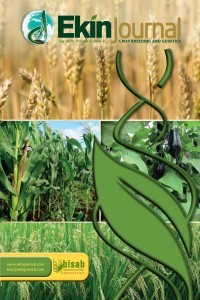Determination of Effect of Chemical Mutagen EMS on TAEK A-3 and TAEK C-10 Mutant Soybean Varieties in M1 Generation
Determination of Effect of Chemical Mutagen EMS on TAEK A-3 and TAEK C-10 Mutant Soybean Varieties in M1 Generation
Today beside ionizing radiation, chemical mutagens are also used in crop improvement and Ethylmethanesulphonate
(EMS) is one of the most widely used chemical mutagens in the field of plant breeding. This research work was carried
out to determine the effect of chemical mutagen (EMS) on seedling height. TAEK A-3 and TAEK C-10 soybean varieties
were used as the test plants and effect of presoaking time determined. In greenhouse and field experiments five
different EMS doses ( 0 (Control), 0,025, 0,050, 0,075 ve 1,0 M) and in greenhouse 3 different presoaking time (0, 6
and 18 hours), in the field 2 different presoaking time (0 and 6hours) were applied. After chemical mutagen application
in the green house germination percentage and seedling height base EMS dose and presoaking time effect had been
determined. Effects of EMS in M1
germination of soybean for different characterics (no. of plants, plant height, no of
pods and seedyield) were determined under field condition. As a result it can be said that in both soybean varieties,
seedling height was reduced as the EMS concentration increased. But there was no distinct influence of presoaking
time on the seedling height in both soybean varieties. In both soybean varieties the average percentage of germination
increased with increasing pre-soaking time. Based on results obtained in field experiment, it was concluded that by 6
hours presoaking the harmful physiolojical effect of EMS could be decreased.
Keywords:
Soybean, Induced mutation, mutation breeding, chemical mutagen EMS,
___
- Anonymous (1977). Manual on Mutation Breeding, Technical Report Series No. 119, IAEA, Vienna p.44-45. Constantin, M.J., Klobe, W.D. And Skold, L.N.(1976). Effects of physical and chemical mutagens on survival, growth and seed yield of soybean. Crop. Sci. (16):49-52. Doll, H., Sandfaer, J.(1969) Mutagenic effect of gamma rays, diethyl sulphate, ethyl methansulphonate and various combinations of gamma rays and chemicals. Induced Mutations In Plant Proceedings of a symposium, IAEA Pullman. Konzak, C. F., Nilan, R.A., Wagner, J., Foster R. J.(1965). Efficient Chemical Mutagenesis. Radiation Botany (Supplement) vol(5). 49-69. Maluszynski, M. (2000). Officially released mutant varieties, The FAO/IAEA Database. Mutation Breeding Review (12): 1-11 Peşkircioğlu, H.(1995). Farklı İki Mutagenin Tek Ve Birleşik Olarak Uygulanmasının Tokak 157/37 Arpa Çeşitinde M1 Ve M2 Generasyonundaki Etkileri. Doktora Tezi. A.Ü Fen Bilimleri Enstitüsü, p123. Sağel, Z. (1994). Bitki Islahında Kimyasal Mutagenler ve Uygulanması, Tarla Bitkileri Merkez Araştırma Enstitüsü Dergisi, Vol.3, No. 1-2, s. 87-93, 1994. Savin, V.N., M.S.Swaminathan and B. Sharma (1968). Enhancement of chemically-induced mutation frequency in barley through alteration in the duration presoaking of seed Mutation Research, Vol. 6, p.101-107 Zakri, A.H., B.S. Jalani and S. Zaini (1982). “Mutagenic efficiency of ethyl methane sulphonate (EMS)in soybean”. “Induced mutation for improvement of grain legume production II. P. 101-108.
- ISSN: 2149-1275
- Yayın Aralığı: Yılda 2 Sayı
- Başlangıç: 2015
- Yayıncı: Bitki Islahçıları Alt Birliği
Sayıdaki Diğer Makaleler
Additional Sources of Resistance for Southern Corn Leaf Blight in Indian Maize Germplasm
Breeding for Adaptation Traits of Wheat in Eastern European Environments the Hungarian Example
Molecular Characterization of Some Triticale Cultivars in Turkey
Helicoverpa Resistant Chickpea Plants: From Bt Toxins to Plant-Mediated RNAi
